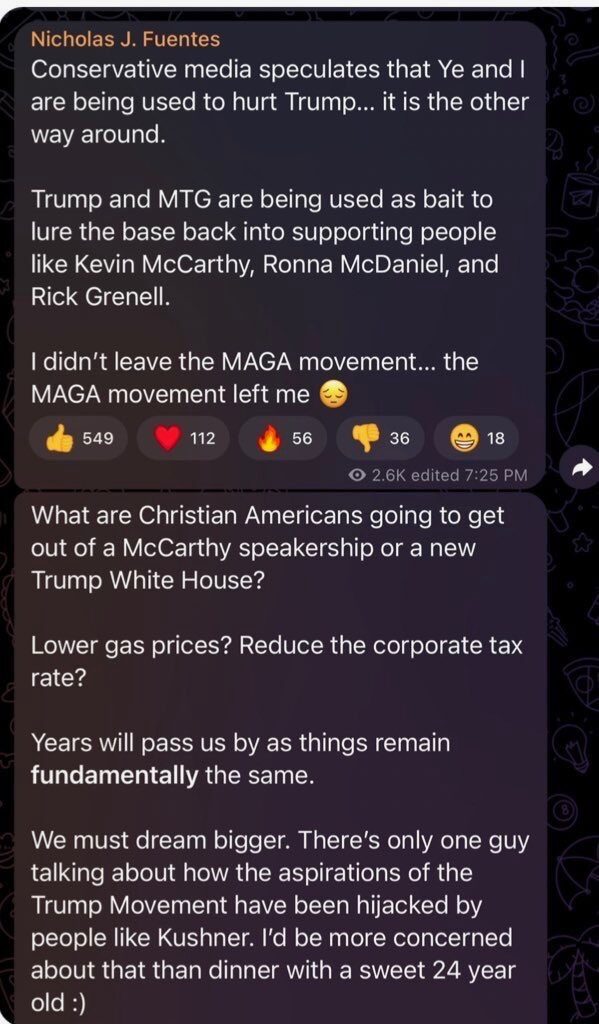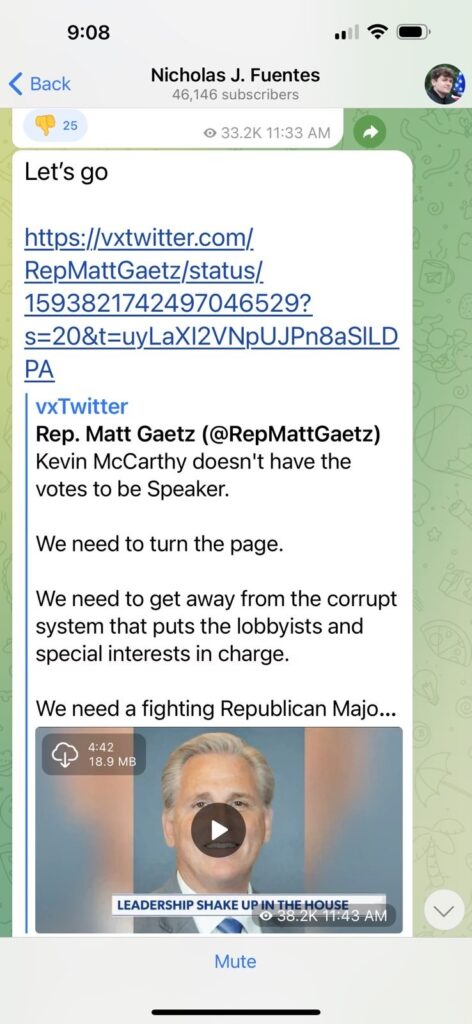
Several top conservatives are warning that if House GOP leader Kevin McCarthy, the Republican nominee for Speaker of the House, does not win the speakership election on the floor of the House on Jan. 3, 2023, a “doomsday scenario” could emerge where Democrats undercut GOP power.
In such a scenario, concerns are rising that so-called moderate—or establishment Republicans—are willing to band together to make a deal with the Democrats to elect a moderate Republican as speaker with Democrat votes in exchange for a House rules change that hands the incoming Democrat minority significant power over how subpoenas can be issued.
Conservatives ranging from Rep. Marjorie Taylor Greene (R-GA) to Congresswoman-elect Harriet Hageman–who defeated outgoing Rep. Liz Cheney (R-WY) in the primary in Wyoming–are urging everyone to get behind McCarthy or risk this possible fate where Democrats seize back some power from the minority.
PATHWAY TO POWER
The way things play out from here is as follows: On Jan. 3, 2023, the new Congress will be sworn in and the old Congress will leave office. The first order of business in the new House of Representatives is that the chamber must elect a Speaker before conducting any other business. To win the Speakership, a candidate must receive a majority of votes from every voting member in the new Congress who is present and voting for a person. If every voting member is present and votes for a person—in other words, if no one is voting “present” or abstaining and if no voting members are absent—McCarthy would need 218 votes on the floor to win the speakership.
There are 435 voting members of the House. Delegates from places like the territories of Puerto Rico and Guam as well as the District of Columbia do not get votes in this election.
Republicans will formally nominate McCarthy on the floor, and Democrats will presumably formally nominate their new incoming House Democrat Leader Rep. Hakeem Jeffries (D-NY). Jeffries is slated to take over as the top Democrat when outgoing House Speaker Nancy Pelosi steps aside in the new Congress. Pelosi will remain a member of the House even though she is stepping aside from leadership.
Republicans had in conference earlier in November selected McCarthy as their official nominee for Speaker. He won 188 votes, and former House Freedom Caucus chairman Rep. Andy Biggs (R-AZ)—who ran against him in conference—won 31 votes. McCarthy’s 188 votes is impressive and better than he has ever gotten before, and he had fewer defectors than his predecessor, former Speaker Paul Ryan, got in conference when he ran for Speaker the first time in 2015, but McCarthy is still 30 votes shy of the needed 218.
Technically speaking, any voting member can vote for any person they want—nominated or otherwise. In recent elections for Speakers, some members have voted for candidates who had not been nominated. A person does not need to be a current member of the House to be elected speaker, and some members have in recent years voted for people like then-Sen. Jeff Sessions (R-AL) or Sen. Rand Paul (R-KY) to be Speaker of the House. Again, to win, a candidate—nominated or not—needs to win a majority
If anyone on either side, Democrat or Republican, is absent, abstains, or votes “present,” the number of votes that McCarthy would need to get drops from 218 to whatever the majority of those present and voting for a particular candidate is.
McCarthy has been facing criticism from some House conservatives like Reps. Matt Gaetz (R-FL), Andy Biggs (R-AZ), Bob Good (R-VA), Ralph Norman (R-SC), and Matt Rosendale (R-MT), who have all said in some form or another that they do not intend to vote for McCarthy. Given the slim majority that Republicans hold in the new Congress—they have won 222 seats—a group of five or more Republicans banding together to vote for someone other than McCarthy–assuming all other members are present and voting for a person–could deny him the majority he needs to win the gavel.
What happens next, if that happens, is what concerns several top conservatives even some who have been critical of McCarthy over the years. Technically speaking, again, the House cannot conduct any business until it elects a speaker. Therefore, denying McCarthy on the floor vote would throw the chamber into chaos until some person emerges with the ability to cobble together 218 votes or a majority of those present and voting for a person on a future ballot. The House will keep holding speakership elections until such time as it elects a speaker.
A THREAT LOOMS
It is in that chaos that conservatives worry Democrats may step up to back an establishment Republican alternative to McCarthy who, in exchange for Democrat votes on the floor of the House to get the majority needed to win the speakership, would agree to rule changes to weaken subpoenas coming from the new House GOP majority into Democrat President Joe Biden’s administration.
The incoming chair of the House Committee on Oversight and Government Reform (OGR), Rep. James Comer (R-KY), has warned of this concern.
“I think it’s of the utmost importance that we agree on a Speaker,” Comer said on Breitbart News Saturday on SiriusXM 125 the Patriot Channel last weekend. “I believe it should be Kevin McCarthy. I believe it will be Kevin McCarthy in the end. But if we have four or five holdouts, that could potentially block Kevin McCarthy and that would allow the opportunity for some of the moderate Republicans to join with the Speaker [Nancy Pelosi]. That wouldn’t accomplish the goal of conservatives that are upset with Kevin McCarthy. We had a vote in conference. Andy Biggs challenged McCarthy. Andy Biggs is a good friend of mine. We came into Congress together. He’s a great member of the House Oversight Committee. But McCarthy prevailed. He prevailed four to one. We need to come together and elect Kevin McCarthy. Obviously, we’re never going to agree 100 percent of the time and we shouldn’t. We don’t need to be like the Democrats and have one leader and everyone follow that leader around like they did Nancy Pelosi. We’re going to have vibrant discussions and debates in our conference. But at the end of the day, we have to agree on the person our conference voted overwhelmingly for, Kevin McCarthy, and not allow the Democrats to kick their foot in the door with a weak, moderate-to-liberal Republican Speaker of the House, which could happen. I’m confident Kevin is going to be the next Speaker and I believe he is going to continue to give Jim Jordan and I the green light to do what we want to do with respect to holding this administration accountable.”
Congresswoman-elect Harriet Hageman of Wyoming, the conservative who defeated outgoing Rep. Liz Cheney (R-WY), also is warning of the possibility.
“The people of Wyoming sent me to Congress to stop the overreach of the Biden administration, and the people of the United States restored Republicans to the majority in the House,” Hageman told Breitbart News. “Under no circumstances should we engage in anything inside the GOP caucus that could result in returning power – in any way – back to the Democrats, the same people who drove the country into the mess we see today. I am supporting Kevin McCarthy for speaker, and I hope my colleagues will see how dangerous it would be to engage in brinksmanship that could allow Democrats a way back in.”
Other conservatives, like Mike Cernovich and Andy Surabian—a former Trump White House aide who serves as the top adviser to Trump’s eldest son Donald Trump Jr.—have warned about this concern as well:
If it’s not Kevin McCarthy, who is it? Will be some “moderate Democrat.” Don’t get played. It’s McCarthy or else a Pelosi puppet,
— Cernovich (@Cernovich) November 18, 2022
The guy leading the charge on this whole thing is Andy Biggs. The same guy who just stabbed America First in the back & voted for Tom Emmer over Jim Banks for House GOP whip. Apparently, his True Conservative™️ “principles” only exist when he’s doing the bidding of Dems. https://t.co/E06kBxLO0Q
— Andrew Surabian (@Surabees) November 18, 2022
So has conservative John Cardillo, a frequent critic of McCarthy who has put aside his criticisms to urge members to unite behind McCarthy out of concern the Democrats may find a way back in:
I’ve long supported guys like @RepMattGaetz and @RepAndyBiggsAZ, but this Speaker fight is now counterproductive and will lead to a deal being cut with Dems.
I’ll take McCarthy and hearings over a deal with unethical Democrats any day of the week.
No deals. No compromises.
— John Cardillo (@johncardillo) November 25, 2022
For people who don’t get it, McCarthy has enough guaranteed votes for Speaker that to install someone else, a deal with Democrats is necessary.
They will ask for things like no hearings into their corruption or vetos on subpoenas.
Absolutely not. No deals with corrupt Dems.
— John Cardillo (@johncardillo) November 25, 2022
Rep. Don Bacon (R-NE), one such establishment Republican who would be considered someone who would work with Democrats to cut such a deal, has publicly confirmed to NBC News that he is open to doing exactly this.
SCOOP: @RepMTG‘s worst fears could soon be coming true.
DON BACON (R-Neb.) tells @NBCNews he’s willing to work with DEMS to elect a moderate Speaker if 218 Republicans can’t agree on a candidate. @RepDonBacon
w/@KyleAlexStewart @jonallendc https://t.co/4HfSLEuW2X
— Scott Wong (@scottwongDC) November 15, 2022
“The Don Bacon crowd are quietly cheering Matt Gaetz and Andy Biggs on,” a donor to Bacon told Breitbart News.
It is not just Bacon talking about this either. Former Rep. Justin Amash of Michigan, who left the GOP because of his disagreements with Trump, has openly floated what he would do as Speaker of the House if he got the job this way:
As speaker, I would:
•Push for single-issue bills
•Let committees work through bills without interference
•Ensure rules are followed, not regularly suspended/waived/ignored
•Allow amendments from the floor
•Give members adequate time to review bills
•Ask for recorded votes— Justin Amash (@justinamash) November 18, 2022
Colorado Gov. Jared Polis, a Democrat who served alongside Amash in the House, praised the idea of Amash emerging as a compromise speaker as well:
A Speaker Amash would let the duly elected members of Congress do the work they were elected to do with real opportunities for members on both sides of the aisle to contribute to a better outcome that truly represents the sum of the best ideas from members of the people’s house. https://t.co/XcMH1qrUcO
— Jared Polis (@jaredpolis) November 18, 2022
Even Rep. Marjorie Taylor Greene (R-GA), who usually joins anti-establishment battles like this one, is warning conservatives against joining this cause. “I actually think that’s a bad strategy when we’re looking at having a very razor-thin majority, with potentially 219 [seats], we’re talking about one vote,” she said in a recent appearance on War Room, warning of this exact doomsday scenario.
REBELS ADMIT THE CONCERN
Gaetz, in an interview with Breitbart News on the matter, admitted multiple times that this is a possible outcome of their effort—but the first time he admitted this, he blamed McCarthy, not himself or the others working against McCarthy, for such an outcome.
“If that were to happen, that would only happen by Kevin McCarthy’s hand,” Gaetz said when asked about the possibility of an establishment Republican emerging as Speaker with Democrat votes in exchange for a rules change neutralizing subpoenas. “The important thing for Kevin McCarthy to do now is to drop out of the race and move on to the next viable option. If he persists with a floor vote that he is certain he will not win, he’s bringing the Republican conference down with him.”
Later in the interview, Gaetz said of the idea that McCarthy will go to the floor and force a floor vote whereby this would be a possible outcome: “I reject the premise that that’s the stage we are going to get to.” What Gaetz is pushing for, he said, is for McCarthy to not even go to the floor vote.
“I believe as more and more members continue to express their opposition to Kevin McCarthy, he should come to the same conclusion he’’s come to before,” Gaetz said. “If Kevin McCarthy abandons his quest for the speakership because he doesn’t have the votes, it won’t even be the first time he’s done it.”
Even so, Gaetz admits it is possible—even though he does not believe this is how it will play out—that McCarthy goes to the floor vote, which opens the door to this scenario.
“We disagree on that, but I get that it’s a possibility,” Gaetz said.
But, he added later in the interview that he predicts it will not end up there.
“It’s not going to be what happens,” Gaetz said. “I have had enough conversations with enough Republicans who give me great confidence that Republicans will elect a Republican speaker with no Democrat votes… I’m not asking Democrats to vote for candidates I support. Kevin McCarthy promised that he wouldn’t either.”
While Gaetz admits this is a distinct possibility, he argues this doomsday scenario in his view is “a McCarthy-inspired bluff.”
Gaetz is the loudest of the anti-McCarthy voices, seconded probably only by Biggs. They have both made clear there is no circumstance under which they would vote for McCarthy.
“I wouldn’t vote for Kevin McCarthy if he was holding my favorite dog for ransom,” Gaetz told Breitbart News, adding: “I can’t imagine a scenario voting for Kevin McCarthy.”
Rosendale, one of the other possible anti-McCarthy votes, has said he would vote for McCarthy under “extreme circumstances”:
Just caught up with Rosendale about this tweet. Asked him whether there was *any* circumstance in which he would vote for McCarthy.
His response: “Only under extreme circumstances,” he said, tho declined to say what those are. https://t.co/PqZdgIhP9h
— Melanie Zanona (@MZanona) November 16, 2022
CHAOS UNFURLING
A former adviser to Mark Meadows, the one-time chairman of the House Freedom Caucus and a former White House chief of staff, told Breitbart News that these anti-McCarthy rebels are not nearly as organized or focused as previous rebellions inside the GOP in recent years.
“This is just flat out embarrassing. Never would have happened when Mark [Meadows] was in charge,” the former Meadows adviser said. “They have no plan, no strategic skills and no ability to see danger on the horizon.”
If this brinksmanship gets to the stage of a floor vote where McCarthy challenges these rebels to defy him on the floor—a very likely pathway for events to unfold—what happens next is a very real concern for Republicans. Obviously, the above-explained “doomsday scenario” whereby Democrats step up to provide the votes necessary to an establishment Republican alternative in exchange for subpoena power is a real threat that even proponents of taking on McCarthy admit is possible.
But outside of that possibility, Gaetz argues there are several other possibilities—but does not have much of a firm plan beyond trying to deny McCarthy the votes.
“One scenario,” Gaetz said, “is next man up,” meaning incoming House Majority Leader Steve Scalise—currently the House GOP whip—moves up a spot into the role.
“I don’t know whether Steve Scalise would have five votes against him—that’s something for him to determine and for him to conclude at a time and manner of his choosing,” Gaetz said. “But that is one paradigm.”
A second scenario Gaetz argued could happen if McCarthy falls is the emergence of a different “consensus” candidate altogether.
“Another paradigm is a consensus Republican elected exclusively by Republicans, someone who has broad support around the conference but would be functionally a figurehead overseeing a coalition government that would include Tuesday Group members, Main Street Partnership members, Freedom Caucus members, America First members, and such a coalition is going to be necessary to govern anyway so why not get to the business of having that type of a small council direct the decisions of the Republican conference,” Gaetz said.
Then Gaetz threw out a third scenario, where he named former or soon-to-be-former members like specifically former Rep. Tulsi Gabbard (D-HI)—who just left the Democrat Party—or Rep. Lee Zeldin (R-NY).
“Scenario three is a former member,” Gaetz said. “You get somebody who is a little divorced from the push and pull of being a current member of the House. There is no requirement that the speaker be a member of the House. But we have former members like Tulsi Gabbard and soon-to-be Lee Zeldin who have broad respect across various groups within the Congress.”
Even though Gabbard has recently left the Democrat Party after she left office, it is highly unlikely that at least 218 House Republicans would band together to vote her in as a GOP speaker of the House. At least a dozen House Republicans laughed when Breitbart News asked them about this in the past week. As for Zeldin, he is widely respected but again unlikely to seek the job and sources close to him said he supports McCarthy unequivocally. Zeldin is currently exploring a bid for chair of the Republican National Committee (RNC) after a closer-than-expected run for governor of New York that lifted several House Republicans in down-ticket races in the Empire State.
The three scenarios Gaetz threw out as other possibilities beyond the doomsday scenario raise serious questions as to what the anti-McCarthy forces like him intend to do if and when they succeed and if there is any kind of plan at all—or if this is just rebellion for the sake of rebellion.
A source close to the House Freedom Caucus told Breitbart News that the lack of planning and serious vision here is causing many members to have second thoughts about joining them.
“I’ve spoken with Matt [Gaetz],” the source close to the Freedom Caucus said. “I’ve spoken with Andy [Biggs]. I’ve spoken with Bob [Good]. They all acknowledge that there’s some risk that the Democrats reach a deal with our moderates to install Paul Ryan 2.0 or some other disaster. Bottom line is they’re putting their personal dislike for McCarthy above the need to avoid the doomsday scenario. This is pure insanity. Andy and Bob aren’t too bright so I give them a pass but I’m very disappointed in Matt. He knows better.”
What is more, one of the biggest cheerleaders of the effort to try to stop McCarthy is none other than the openly white nationalist Holocaust denier Nick Fuentes. Fuentes, of course, made national headlines over Thanksgiving weekend for having dined with former President Donald Trump and rapper Kanye West at Mar-a-Lago last Tuesday.
In addition to the lack of a serious and well-thought-out plan, the fact that one of the biggest supporters outside Congress of this effort is none other than Fuentes—who, as Breitbart News has detailed, is an actual white nationalist and Holocaust denier—is not likely to win more supporters to this cause.
Fuentes, on his Telegram page, has repeatedly hyped the effort. He pushed a tweet from Gaetz bashing McCarthy and promoting this exact push saying “let’s go.” He also attacked Trump for endorsing McCarthy and Greene for backing him as well, saying Trump and Greene are “being used as bait to lure the base” into backing among others McCarthy.
He also says in that post that he is no longer a MAGA supporter: “I didn’t leave the MAGA movement… the MAGA movement left me.”
Fuentes’s dinner with Trump and Kanye West last week seriously hurt Trump, and his emerging as a face of the effort against McCarthy could help derail it.
HISTORY FAVORS MCCARTHY
Throughout history, only a handful of speaker votes have gone to subsequent ballots. For instance, in 1855, Congress could not agree on a speaker for two months—and held 133 elections between Dec. 3, 1855, and Feb. 2, 1856, until finally electing a Speaker after the House finally whittled down the choices from 21 different candidates at the outset of that Congress.
Since then, the last time a speakership vote went through multiple ballots was nearly a century ago on Dec. 4, 1923, when the speakership election went through multiple ballots before then-Speaker Frederick Gillett was finally reelected.
Oftentimes, however, in the lead-up to a speakership vote especially in a tight margin in Congress, there is much chatter like this, but things usually work out for the nominee of the majority party in the end.
While no vote has gone multiple ballots since a century ago—again, at no time during the modern era where such proceedings are televised for the American public to see them happening live has this happened—a decade ago it nearly did happen again. Back in late 2012, as Breitbart News reported at the time, a group of conservatives banded together to try to use this exact strategy against then-Speaker John Boehner in early 2013. While they failed on the floor, it weakened Boehner heading into then-President Barack Obama’s second term. That made way for another attempt against Boehner on the floor of the House in January 2015 at the beginning of the next Congress and finally to Boehner’s ouster in the fall of 2015 using an arcane rule written into the rules of the House by the author of the Declaration of Independence and the third president of the United States, Thomas Jefferson himself. Boehner ended up resigning to avoid a vote he knew he would lose if it were called.
Technically speaking, Boehner was about to go down in January of 2015 though—the second rebellion—when conservatives had denied him 218 votes. But he ended up winning the speakership with 216 votes because a number of lawmakers were absent due to snowy weather conditions around the country and because several Democrats were at the funeral of former New York Gov. Mario Cuomo. Pelosi would later win the speakership, last year, with just 216 votes as well.
Even so, in each of these cases, the majority party nominee for speaker ended up winning on the floor—even it was sometimes closer than they would have hoped.
It remains to be seen how this one shakes out, but McCarthy has a lot of time—more than five weeks until the vote—and a lot of room to bargain with holdouts.





